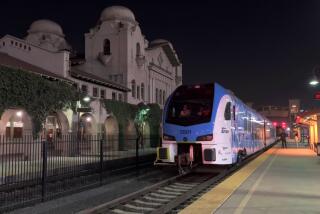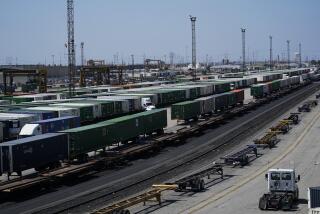Placentia’s Not Whistling a Happy Tune
- Share via
Placentia residents unhappy about freight-train whistles waking them in the wee hours of the morning won’t find much relief when they protest at the City Council tonight. Some of the council members are losing sleep too and say there’s not much they can do about it.
The Federal Railway Administration recently announced it will no longer honor “quiet zones” like Placentia, where whistle blowing at the approach of railroad crossings was banned 25 years ago.
Although the railway administration rules won’t be finalized until later this year, Burlington Northern & Santa Fe Railway Co. advised Placentia that it would begin letting loose with the whistles starting this past Sunday, which might have seemed a poor April Fools’ joke to some Placentia residents who live near the tracks. Burlington operates about 75 daily freight trains, around the clock, in northern Orange County.
The railroad company jumped the gun on the new policy, city officials say, in part for fear of rolling energy blackouts and concern that safety arms at intersections won’t come down when a train is approaching.
“The residents need to understand, it’s strictly a safety issue,” said Lena Kent, a Burlington spokeswoman. “Federal studies show that [train/vehicle] accidents increase 62% when whistles are silent approaching street crossings.”
Placentia was the last city in Southern California to have a “quiet zone.” Placentia’s 11 street crossings are more than all other street crossings combined through Orange County, in part because other towns have built underground or aboveground passes. Also, Placentia sprang up as a railroad town. It was the heart of the area’s citrus business and needed the rails to haul goods.
In 1986, the state attorney general’s office ruled that such whistle bans were not enforceable.
“Since that time, we’ve only been able to plead as good neighbors that the whistles not be blown,” said Christopher Becker, the city’s public works director. Burlington complied voluntarily.
But its whistles began blasting through Placentia soon after midnight Sunday morning, angering scores of residents not used to the sharp racket.
“It’s impossible to sleep with that noise,” said resident John Cullum, who recorded the train whistles for the council’s benefit tonight. “Something has got to be done.”
By federal policy, the trains sound two long blasts, followed by a short one, then two more long ones about one-quarter mile before a street crossing. The whistle doesn’t stop until the engine car has passed the street. The whistle routine takes 10 seconds, usually longer.
Councilman Norman Z. Eckenrode is sympathetic to complaining residents.
“The whistles woke me up at 3 o’clock in the morning,” Eckenrode said. “I know why people are upset. But federal law supersedes anything we can do.”
Mayor Chris Lowe has issued a statement that “Safety concerns within our community must remain our top priority.”
The city has two alternatives to try to appease residents:
* The railway administration has agreed to honor a quiet-zone pilot project for cities that can come up with other, supplemental safety measures at crossings. But federal officials are still ironing out what those will be and which cities would qualify. Placentia officials have asked to be considered.
* The only long-term answer, city officials say, is for residents to get behind plans for lowering rail lines in northern Orange County. Placentia supports those plans, as does Yorba Linda, Fullerton, Anaheim and the county government. If train tracks can be pushed 35 feet below street level--running along Orangethorpe Avenue--there would be no need for the whistles. But the cities are still trying to come up with the $400 million funding it will take.
Actually, some train whistles have been blowing in Placentia for years. Both the Amtrak and Metrolink trains have always sounded their whistles.
“But they aren’t coming through at 3 in the morning when people are asleep,” Becker said. “Most people are working in the daytime when those trains come through, so people don’t really notice their whistles.”
Kent believes residents will eventually get used to Burlington’s early-morning whistles.
“We do get complaints from other cities too, but we also get feedback from people who say they’ve gotten used to them,” Kent said. “Some people actually enjoy them.”
More to Read
Sign up for Essential California
The most important California stories and recommendations in your inbox every morning.
You may occasionally receive promotional content from the Los Angeles Times.













